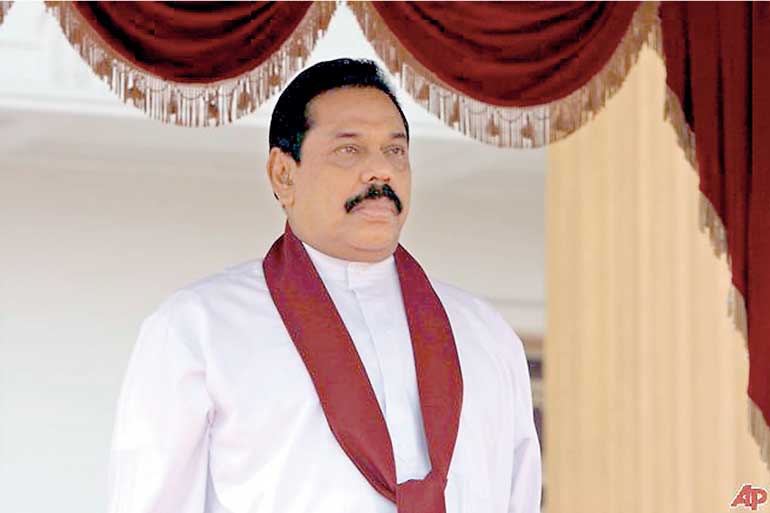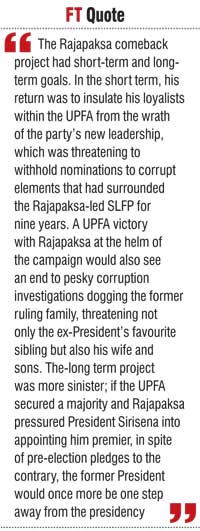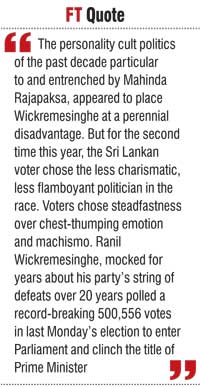Friday Apr 19, 2024
Friday Apr 19, 2024
Thursday, 27 August 2015 00:10 - - {{hitsCtrl.values.hits}}

Former President Mahinda Rajapaksa
After a double whammy of electoral defeats this year, will spoiler-in-chief be the only role left for Mahinda Rajapaksa to play on the political stage?
The small village of Medamulana, nestled deep inside the Hambantota District, is a place of tranquility and scenic beauty. Tiny lakes glisten in the bright sunshine, studded with bright pink lotuses in full bloom. Endlessly green paddy fields extend as far as the eye can see, coconut trees dance and rustle in the wind. It is as idyllic as rural Sri Lanka gets.
Unfortunately, former President Mahinda Rajapaksa was not the retiring sort. Not for him the quiet life. Not for him elder statesmanship and precious family time. So instead, seven months after his humiliating defeat to his former health minister and presidential challenger, Mahinda Rajapaksa decided to craft the story of his political comeback.
“Mahinda Rajapaksa is a political animal,” says Jayadeva Uyangoda, Professor of Political Science at Colombo University. “He cannot afford to be out of politics.”
According to Professor Uyangoda, mounting allegations of corruption and the investigation of those claims by the authorities as part of the Government anti-corruption drive, pushed the former President back into the political fray. “To fight back against these allegations and protect his family, Mahinda Rajapaksa will continue to play a role in politics,” the political scientist opines.
The Rajapaksa comeback project had short-term and long-term goals. In the short term, his return was to insulate his loyalists within the UPFA from the wrath of the party’s new leadership, which was threatening to withhold nominations to corrupt elements that had surrounded the Rajapaksa-led SLFP for nine years. A UPFA victory with Rajapaksa at the helm of the campaign would also see an end to pesky corruption investigations dogging the former ruling family, threatening not only the ex-President’s favourite sibling but also his wife and sons. The-long term project was more sinister; if the UPFA secured a majority and Rajapaksa pressured President Sirisena into appointing him premier, in spite of pre-election pledges to the contrary, the former President would once more be one step away from the presidency.
Furthermore, the UPFA’s Rajapaksa faction, which fought tooth and nail against the 19th Amendment, specifically on the grounds that it enhanced the powers of the Prime Minister, campaigned heavily to make Mahinda Rajapaksa Sri Lanka’s first ‘executive’ Prime Minister. On campaign stages, Rajapaksa acolytes promised that President Sirisena would be redundant when his predecessor took office as Prime Minister.
Fatal blows
Those dreams ended on 17 August, when voters rejected his politics for the second time this year. The UPFA secured enough seats to ensure the party remained a formidable Opposition in Parliament, and within this group, Rajapaksa will remain an equally formidable force. But Monday’s election dealt fatal blows to the mythology surrounding the ex-President, who since his ouster has loomed over Sri Lankan politics like a dark and threatening shadow over a long and slow democratic reforms process.
Two central myths of the Rajapaksa campaign broke down on Election Day. The first was that the former President was still hugely popular, significantly more so than Prime Minister Ranil Wickremesinghe. The pair faced off directly in this parliamentary contest for the first time in a decade, after they fought for the presidency in November 2005.
In Sri Lankan politics, Wickremesinghe is the anti-Mahinda, often criticised for being a cold and aloof politician, out of touch with the common people. Mahinda Rajapaksa cuddles babies and greets supporters like long lost friends, always supremely comfortable in his own skin. Wickremesinghe is socially awkward and uncomfortable in the spotlight; his political speeches have a rehearsed quality and he rarely connects with supporters even at events where party spirit is running high. The personality cult politics of the past decade particular to and entrenched by Mahinda Rajapaksa, appeared to place Wickremesinghe at a perennial disadvantage. But for the second time this year, the Sri Lankan voter chose the less charismatic, less flamboyant politician in the race. Voters chose steadfastness over chest-thumping emotion and machismo. 
Ranil Wickremesinghe, mocked for years about his party’s string of defeats over 20 years polled a record-breaking 500,556 votes in last Monday’s election to enter Parliament and clinch the title of Prime Minister. And while Mahinda Rajapaksa polled a greater percentage of votes drawn by his party in the Kurunegala District, there was a clear winner in the preferential race - the secondary contest in a parliamentary election that tests the popularity of individual candidates. Rajapaksa picked the Kurunegala District with is 1.3 million electors, to bolster his premier stakes. His home base of Hambantota with only 462,000 registered voters would have rendered the ex President irrelevant in the competition for preferential votes, with Wickremesinghe contesting in Colombo, with its 1.5 million electors. In last week’s election the incumbent Prime Minister shattered Chandrika Kumaratunga’s 1994 record of 464,588 preference votes polled in the more populous Gampaha District.
Myth 2
The second myth was that Rajapaksa could never be defeated in an election fought predominantly in the island’s south, where 75% of electors are majority Sinhalese. Mahinda Rajapaksa claimed he had been defeated in January by ‘Eelam’ votes, referring to President Sirisena’s strong showing in the Northern and Eastern districts of the country that gave him an unassailable lead over his incumbent rival. This is a storyline the Rajapaksa camp has stuck to, and quite possibly believed throughout their general election campaign these past six weeks. With his 5.8 million votes already in the bag, nearly all drawn from districts south of Vavuniya, how could the UPFA, led by strongman Rajapaksa possibly lose? Without the guarantee of a bulk Tamil vote in the North and East, how could the UNP win?
But last Monday, in an election battle between the two main parties that largely excluded the North and the East, the UNP prevailed. This time without ‘Eelam’ votes.
The Rajapaksa campaign deluded itself ahead of the January election about the ex-President’s continued popularity across the island, despite electoral trends from 2012-2014 showing a drastic drop in support for his coalition.
The mathematics foretold Mahinda Rajapaksa’s presidential election defeat long before he consulted his astrologers and declared elections two years ahead of schedule. With his vote share among the Sinhalese majority decreasing rapidly since 2010, and without the support of the minority communities that his Government had consistently alienated and persecuted, Rajapaksa could not win the presidency for a third time. The only real question in the January election was to what extent the ex-regime would use dirty tricks to swing the result its way.
Ahead of the 17 August election, similar illogic prevailed. Electoral trends and forecasts failed to show a major wave of support for the ousted ex-President. If anything, his re-entry helped the forces of the 8 January victory of Maithripala Sirisena and his UNP-led coalition to regroup.
Rajapaksa theologians predicted a seat haul of over 100 for the UPFA, excluding the national list. Campaign ideologues like Dr. Dayan Jayatilleka gushed about a “revolution in the villages” where the ‘Mahinda sulanga’ was changing hearts and driving people to vote their hero back into office. The ‘58 lakhs’ could not be defeated, their numbers if anything, were swelling, as January voters tried to correct their grave mistake in August, or so the Rajapaksa campaign would have it.
Eroded support
Reality fell far short of the illusion - again. In the seven months between 8 January and 17 August, Mahinda Rajapaksa lost 1.1 million votes, and under his stewardship, the UPFA lost support in every electoral district in the island, even regions long considered the former President’s best political hunting grounds. Even in Kurunegala, where Rajapaksa was contesting as a candidate, the UNP bagged the district’s postal votes and was defeated by a mere 32,000 votes. In January, Mahinda Rajapaksa prevailed over his rival Sirisena in the Kurunegala District with an 80,000 vote lead.
But while the former President may have suffered another humiliating electoral defeat so soon after he lost the presidency, there were big winners in the Rajapaksa camp who owe their success directly to Mahinda Rajapaksa’s decision to contest the parliamentary poll. 
As dawn broke on 18 August, Pivithuru Hela Urumaya Leader Udaya Gammanpila conceded the UPFA’s defeat in the election on his verified Facebook account. The concession was followed up with a gloating sentence about how he had managed to poll 200,000 preference votes in the Colombo District. Wimal Weerawansa, arguably the former President’s staunchest ally and leader of the National Freedom Front, managed to get five members of his party into Parliament, with many of these candidates ranking second highest or third highest in the preference vote list in several districts. Weerawansa’s election campaign was one of the best funded in the UPFA race, by virtue of his being Mahinda Rajapaksa’s most trusted lieutenant. 
Weerawansa and Gammanpila polled first and second in the UPFA preferential tally in the Colombo District, showing up senior SLFP members on the list. Both candidates were the strongest backers of the Rajapaksa candidacy and they led constituent parties within the UPFA that may have been thrust into political oblivion if piggybacking on the Rajapaksa brand had not been an option.
According to some analysts, while the Rajapaksa reentry may have galvanised the forces that moved against him in January, propelling the UNP-led coalition to victory last Monday, the ex-President may also have played a role in ensuring the SLFP/UPFA did not suffer a crushing defeat in the poll.
The 17 August result makes clear that support for President Sirisena lies still within the UNP base, with the party reclaiming victory in many of the electorates Sirisena had also won in January. The SLFP, smarting from his betrayal last November, may still be unwilling or unable to see Sirisena as the party’s true leader. While President Sirisena’s leadership of the UPFA/SLFP campaign in the election could have attracted a share of the minority votes to the party, it remains wholly uncertain if he could have got his party to 95 seats, despite being the chief custodian of the January mandate for good governance.
Post-election, the Rajapaksa coterie within the UPFA has howled about President Sirisena’s tactics of sabotage two days before the election. Weerawansa and Gammanpila still believe the President snatched certain victory away from the UPFA by sacking two party secretaries, writing five-page missives to his predecessor flatly refusing to appoint him premier and kicking the UPFA campaign offices out of the SLFP headquarters at Darley Road. If this perception prevails for Rajapaksa himself, the SLFP looks set for a long and acrimonious power-struggle between Presidents past and present, as each tries to wrest back control and consolidate support within the party.
SLFP power struggles
Prof. Uyangoda believes the prospect of reconciliation between Sirisena and Rajapaksa are now more remote than ever. President Sirisena, the political scientist explains, has shown himself to be a shrewd and calculating politician with a good sense of tactics and timing, prepared to give no quarter as far as his predecessor is concerned.
President Sirisena’s last bombshells ahead of the election, Prof. Uyangoda claims profoundly angered the rank and file SLFP and pushed them more firmly into Rajapaksa’s corner. “Party men felt a deep sense of abandonment by the SLFP chairman, even those who may have been quite loyal to the President,” he explains.
Two days ahead of the election, Rajapaksa was exuding confidence. “I am 100 percent sure I will win,” he told a foreign correspondent hours before campaigning ended on 14 August. “And he (Sirisena) will have to give me the premiership.” How much of this was bravado and how much was indicative of the election forecasts his allies were plying with him is uncertain.
Prime Minister Ranil Wickremesinghe was equally confident ahead of the polls, telling reporters on Saturday (15) that Mahinda Rajapaksa’s political obituary could have been written on 8 January. Going forward, it may be to Wickremesinghe that the former President will have to turn, relying on old parliamentary ties to hold him steady as he strives to fend off corruption investigations against his family.
Staying in active politics could prove to be the only way he can continue to fight the corruption charges against himself, his family and his political cronies. “He is a fighter,” says Prof. Uyangoda. “And he can’t afford not to be in politics.”
New role
As he sets out to serve a five-year term as Kurunegala District MP in the Opposition ranks, Mahinda Rajapaksa must create a new role for himself. For seven months he used proxies to fight battles on his behalf within the Chamber, opposing the 19th Amendment and hosting slumber parties in the Well. Now the ex-President will have the opportunity to lead his UPFA loyalists from the front, striking out independently from sections of the SLFP loyal to President Sirisena that will cohabit with the UNP inside a national government.
His first opportunity will present itself in September, when the UN war crimes report is set for release, believed to contain damning indictments against tactics used by his regime and battlefield commanders staunchly loyal to the Rajapaksa regime within its pages. How will MP Rajapaksa react to the UN report and the Government’s plans for Right to Information legislation and further constitutional reform to strengthen democratic institutions that his own administration deliberately and systematically eroded? Will he whip up support against the UNP budget due in November? Will he strive to forge alliances in the House, and with whom?
In a parliamentary career spanning four decades, MP Mahinda Rajapaksa made no great impact. He is better remembered as a street-fighter politician, famous for his role in the anti-UNP movement of the 1980s-90s.
In an odd way, the clock appears to have been reset on the former President’s political career. He will reclaim an old role as an opponent of an incumbent regime led by the UNP, standing counter to the party’s Western, liberal outlook and urban, educated appeal.
If he chooses to serve out his term, fighter instincts may again be his lasting legacy in this latest stint in the legislature. Sri Lanka may not have seen the last of Mahinda Rajapaksa, but compared with his iron rule spanning a decade, this time will be much less extraordinary.